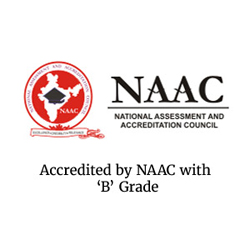Policy on Grievance Redressal Cell
The Gonzaga College (GC) expects all its Officers and employees to maintain highest standards of integrity and transparency in their working conditions with students and staff. Student Grievance Redressal Cell (SGRC) is instituted in Gonzaga College to help the students to solve their common academic and administrative problems. It is expected that all employees shall devote attention, time and effort at resolving the Grievances of the students and staff within the framework of the policy. Gonzaga College Student Grievance Redressal Cell (GCSGRC) is constituted in order to develop a responsive and accountable attitude among all stakeholders to maintain a harmonious educational atmosphere.
Grievance: Definition
The college has established effective mechanisms for attending to the grievance of students and staff. “Grievances or complaint” includes any communication that expresses dissatisfaction, in respect of the conduct or any act of omission or commission or deficiency of service and in the nature of seeking a remedial action but do not include the following
Complaints those are incomplete or not specific in nature;
Communications in the nature of offering suggestions;
Communications seeking guidance or explanation
The Objectives
a) To develop an organisational framework to resolve Grievances of Students and staff
b) To provide the Students and staff access to immediate, hassle free recourse to have their
Grievances redressed
c) To enlighten the Students and staff on their duties and responsibilities
d) To establish structured interactions with Students and staff to elicit information, academic and administrative process on their expectations
f) To institute a monitoring mechanism to oversee the functioning of the Grievance Redressal Policy, and
g) To ensure effective solution to the student’s grievances with fair approach.
Gonzaga College Student Grievance Redressal Committee (GCSGRC)
The composition of Gonzaga College Student Grievance Redressal Committee (GCSGRC) is
namely:
a) Principal of the college – Chairperson
b) Three senior teaching faculties to be nominated by the Principal – Members;
c) A representative from among students of the college to be nominated by the Principal based
on academic merit/excellence in sports/performance in co-curricular activities – Special Invitee.
(ii) The tenure of the members shall be two years.
(iii) The quorum for the meeting, including the Chairperson, but excluding the special invitee, shall be three.
(iv) The GCSGRC shall send its report with recommendations, if any, to the principal and a copy thereof to the aggrieved student, within a period of 15 days from the date of receipt of the complaint.
(v) The GC shall endeavour to improve service through constant interactions with the students and staff to elicit their views on academic and administrative standards, and to seek their suggestions for improvement.
(vi) At least one meeting per semester shall be held to offer opinions and suggestions on Student/staff academic and administrative standards and services.
The Procedure for lodging Grievances
The candidates can raise grievances through the following modes:
▪ Phone Call: Call at <contact number> to register the complaint
▪ Email: The candidate may write to <gcsgrc@gmail.com>
▪ Suggestion Box is fixed at the strategic points to express the grievances
▪ Letter: Students may also raise the grievance by writing to Grievance Redressal
Officer
▪ The application form for submission of grievances can be downloaded from website
and submitted to Student Grievance Redressal Cell in person or through email
▪ The student can also approach the grievance redressal cell if they have any through
student council
▪ Any Grievance of a faculty on academic matters is generally presented by the Head of
the department in the meeting.
▪ The Secretary / principal is always accessible to the faculty to share their Grievance
▪ The faculty members can present their Grievance to the management in the staff meetings.
▪ The non – teaching staff present their Grievance to the secretary /principal
▪ Parents Grievance are attended to by the management / Department during parent – teacher meeting
Function of GRC
The grievance cell will assure that the grievance has been properly solved in a stipulated time limit provided by the cell. The GCGRC deals the issues in the following manner
• Open the Grievance / Suggestions Box every week to check out and address the grievances/ suggestions placed there
• The grievances received will be recorded and the applicant shall be provided with a unique grievance number generated under GMS for future reference for grievance registered.
• An acknowledgement shall be sent to the complainant within three working days of the receipt of the grievance. Acknowledgement shall contain Date of receipt of complaint/grievance, Unique \Grievance Number, Expected date for resolution of grievance, Name, Designation and Contact details of Officer, and mode of tracking resolution of grievance/complaint with the Unique Grievance Number.
• Scrutinize grievances so that they can be recorded and redressed; and to communicate the remedial measures and decisions to the Management and the concerned parties in the form of a report.
• Attend promptly on the receipt of written grievances along with the necessary documents
rom the students
• Hold a meeting of the Cell as required, to attend to the problems commonly faced by the students/staff
• Review the cases and initiate effective measures in a stipulated time limit provided by the cell
• The number of grievances, settled or pending will be reported to the Principal every month
Investigation Process
Clarifying and documenting details of the complaint
• Interviewing witnesses and asking for an account of incidents where appropriate.
• Interviewing the respondent, outlining specific allegations made, and giving her the opportunity to make a full response
• Considering the relevant evidence;
• Making judgments on issues with due weightage given to probability, reasonableness and appropriateness
• Making referrals in recording, as appropriate
• Carefully documenting the process, all decisions made or actions taken.
• Resolution time shall not exceed 30 days from the date of the receipt of the complaint from the complainant

